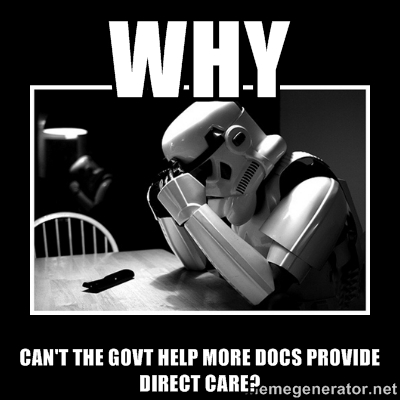According to the New York Times, “American physicians, worried about changes in the health care market, are streaming into salaried jobs with hospitals.” This exodus is most severe in primary care, followed by specialists.
And get this: Health economists unanimously agree “that the United States should move away from fee-for-service payments to doctors.” As you know, our status quo healthcare system is a place where private physicians get paid per procedure/test. The problem is, that besides the red tape, our $2.7 trillion healthcare bill skyrockets thanks to the motivation to overuse it. Unfortunately, the “experts” believe that when docs migrate from private practice to salaried jobs things might not get cheaper for patients.
Okay, but why the exodus then? First, of course, the hospitals have been ponying up to attract physicians. Employment deals include incomes that are higher than private practices. This is so that they can form networks that take advantage of new ACA incentives. Hospitals also know that by hiring more doctors, they can get more of their patients to use the same labs and services provided by the hospital i.e. go downstairs to get your lab work done, etc.
Secondly, over the last 10 years Medicare has reduced doctors’ fees. Meanwhile, insurers have demanded lower and lower rates from small practices because they lack the clout to resist. The Times reports that Dr. Robert Morrow, a family doctor in the Bronx, “said he now received $82 from Medicare for an office visit but only about $45 from commercial insurers.”
There seems to be something uniting both types of doctor employment — red tape. We’ve been saying this all along. Cut the rep tape, and lower the cost of care. And yes, we admit that in the short run, there could be issues with doctor shortages (direct care docs see fewer patients than fee-for-service docs). However, we believe that making a job more rewarding will increase the supply of workers. We also believe that there is something interesting about demand for healthcare in our subscription model.
For one, patients who NEED CARE, will definitely come in and get care. They’ve already paid for it, there’s little, if any, additional cost. Secondly, doctors will not be motivated to do superfluous work just to make ends meet. Patients have already paid for the subscription. That’s the bulk of revenue they’ll need to keep their lights on. In the end, if the U.S. fully implemented direct care, the demand for healthcare, the supply of doctors and the care provided would ALL SHIFT, mostly towards more ideal outcomes.
Compare that with The New York Times research into expert predictions regarding the doctor exodus from private practices into salaried jobs. “In many places, the trend will almost certainly lead to more expensive care in the short run,” said Robert Mechanic, an economist who studies health care at Brandeis University’s Heller School for Social Policy and Management.
Ouch.
